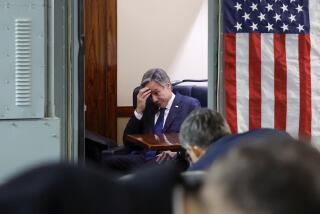U.S. Rules Out Military Force to Aid Bosnians
- Share via
WASHINGTON — Secretary of State Warren Christopher on Wednesday ruled out any U.S. military action to stop the fighting around Sarajevo or to block the partition of Bosnia-Herzegovina, saying the United States is already “doing all that it can consistent with our national interest.”
Christopher, Defense Secretary Les Aspin and National Security Adviser Anthony Lake have met several times this week to consider whether the United States should do more to help civilians in Bosnia. But they concluded that there is no new military action that would be effective at an acceptable cost, officials said.
Bosnian President Alija Izetbegovic appealed for foreign intervention this week as Serbian forces advanced toward his capital and Croatian forces blocked humanitarian aid convoys. But Christopher, at a State Department news conference, effectively rejected the plea.
“That’s a tragic, tragic situation in Bosnia. . . ,” he said. “It’s the world’s most difficult diplomatic problem, I believe. It defies any simple solution. The United States is doing all that it can consistent with our national interest.”
Christopher acknowledged that the United Nations’ commitment to set up safe areas around Sarajevo and other Bosnian cities “certainly seems not to have been effective.”
But, he said, U.N. commanders on the ground have not recommended any greater use of force, and the United States agrees.
Instead, he said, the Clinton Administration is concentrating on getting humanitarian aid to the war’s victims, encouraging a diplomatic solution to the conflict and preventing the fighting from spreading to neighboring republics.
“Our national interest . . . is in humanitarian relief, to the extent that we can provide it, coupled with preventing the spread of the conflict (and) doing all we can to make sure that those who are involved in evil conduct there realize that they will be subject, as people, to war crimes trials and, as nations, to continuing sanctions,” he said.
He said that the Administration is willing to use U.S. military power in Bosnia only to help implement a peace agreement or to defend U.N. troops if they come under fire.
Asked whether the United States would use force if Sarajevo were on the verge of falling to Serbian forces, Christopher said that the Administration has not changed its views.
The United States has deployed 30 ground-attack jets and 10 support planes in Italy as part of a North Atlantic Treaty Organization force to protect U.N. troops in Bosnia. But Christopher noted that the aircraft will not be used to stop attacks on Bosnian civilians or to defend the safe areas.
Serbian and Croatian forces have not directly attacked U.N. forces in recent days, so there has been no request for the air power, officials said.
The secretary of state pointed out that the United States has delivered an estimated $350 million in humanitarian aid to the republics of the former Yugoslav federation, including six aid flights into Sarajevo on Tuesday alone.
The Administration also has sent 300 troops to Macedonia, on Serbia’s southern border, in an effort to deter any expansion of the Balkan warfare there.
Christopher also has been active in diplomatic efforts to encourage a compromise in Bosnia, to escalate economic sanctions against Serbia and to organize an international war crimes tribunal to pursue the authors of the war’s atrocities.
Asked whether the United States would accept an agreement that divided Bosnia into three parts, Christopher indicated that the Administration would accept that outcome if the Bosnians did.
The republic’s Serbs and Croats have agreed on a plan dividing Bosnia into three virtually independent ethnic provinces and are pressuring the Muslims to accept it.
Christopher said the main concern of the United States in any settlement is “that there should be a state of Bosnia and that we support its independence and territorial integrity.” He said the Administration is not concerned about whether the ties among the provinces are close or loose.
Another senior official said that Christopher, Aspin and Lake briefly reopened the Administration’s internal debate over Bosnia last week as the situation on the ground worsened but found no new approaches that looked promising.
“There are new developments on the ground there, in terms of the security of Sarajevo and the role of the U.N., (so) they’ve opened the discussion up,” the official said. “It was a good time to review the bidding.”
More to Read
Get the L.A. Times Politics newsletter
Deeply reported insights into legislation, politics and policy from Sacramento, Washington and beyond. In your inbox twice per week.
You may occasionally receive promotional content from the Los Angeles Times.










